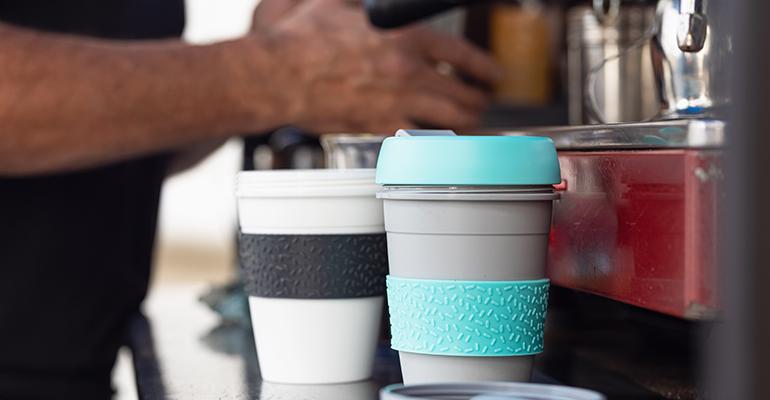Just as restaurants are starting to wake up to the harmful effects of using disposable cups, containers, and flatware every day, coronavirus has put an unforeseen wrench into the reusables movement. Although several restaurant and cafe chains have started to move away from disposable materials by offering discounts to customers for bringing in their own cups, selling reusable bowls, and offering reusable container subscription programs, they’ve had to rethink these policies during the COVID-19 pandemic.
Starbucks and Dunkin’ were two of the first chains to announce cautionary measures against community spread of disease. Last week, both coffee chains announced that they would no longer be allowing customers to bring in their reusable cups or mugs from home.
“We will continue to honor the 10-cent discount for anyone who brings in a personal cup or asks for 'for here' ware," Starbucks said in a statement on March 4.
Other large restaurant brands have followed suit in order to increase safety measures around the coronavirus health scare by banning cups, mugs or other containers that a customer brings from outside the store.
- Tim Horton’s has banned personal mugs and cups
- Subway has removed dine-in sandwich baskets and serving trays (and will give customers a new cup when they want a refill.)
- The 40-unit, New York City-based Just Salad chain has paused its Restaurant Reusable Program, even though their staff never touches the reusable customer bowls, in an effort to “ease the anxieties” of customers.
- The 17-unit, Portland, Ore.-based Stumptown Roasters is pausing the use of personal reusable cups, but will still offer the reusables discount to customers that want to bring one in.
For some restaurants and cafes, the zero-waste movement has become a part of their brand identity. At the end of 2019, Oakland, Calif.-based, 72-unit coffeeshop chain Blue Bottle Café announced that they would be testing a removal of all disposable containers and cups from their Bay Area-locations.
Although the policy had not been rolled out nationwide yet, it was part of an initiative to go zero-waste at all of their cafes by the end of 2020. But by the beginning of the month, that zero-waste goal had been brought to a grinding halt in response to the unforeseen health crisis:
“We have temporarily suspended accepting personal cups at all our cafes,” Blue Bottle said in a letter to customers. “We will continue to honor our 25¢ discount to all who bring their own cup to a cafe, but we are serving all to-go orders in our disposable cups for the time being.”
Blue Bottle will be adjusting their policies as the situation changes daily.
For some independent restaurants and cafes and small chains, the momentum of the reusables movement has just changed instead of being paused or halted completely in the wake of coronavirus.
Nossa Familia Coffee, a Portland, Ore.-based coffee shop group with four cafes, which has set a goal of becoming zero-waste, will still be distributing (fully-sanitized) for-here mugs, but will not be directly handling personal mugs, which customers bring in to receive a 25-cent discount on their coffee order. Instead, customers will bring in their personal mugs (and still receive the discount) and baristas pour the drink into a separate container that the customer can then use to transfer to their own mug. They will still drip coffee poured directly into a personal mug, but with taking “extra precautions not to cross-contaminate spouts and surfaces.”
Perch Coffee House, an independent coffeeshop in Oakland, Calif., is another café with zero-waste-leaning, eco-friendly policies that predate the coronavirus outbreak. They have been completely disposable-free since September and coffee drinkers can either bring in their own mugs or rent a glass jar for 50 cents.
Now with the COVID-19 pandemic underway, they won’t be reverting back to disposables, and will instead enact a similar policy as Nossa Family Coffee: Baristas will make drinks in the company’s own thoroughly sanitized containers and then customers will pour the drink into their own mugs. If customers bring back one of the house jars or mugs, it will be thoroughly cleaned and customers will be offered a different mug.
Even after the coronavirus panic calms down, these new cautionary sanitation policies could forever change the way the zero-waste movement thinks about reusables.
“This may be our permanent policy as it is the most sanitary practice and there is a possibility that coronavirus may be part of our normal flu season,” a representative with Perch Coffeehouse said.
Contact Joanna Fantozzi at [email protected]
Follow her on Twitter: @joannafantozzi





